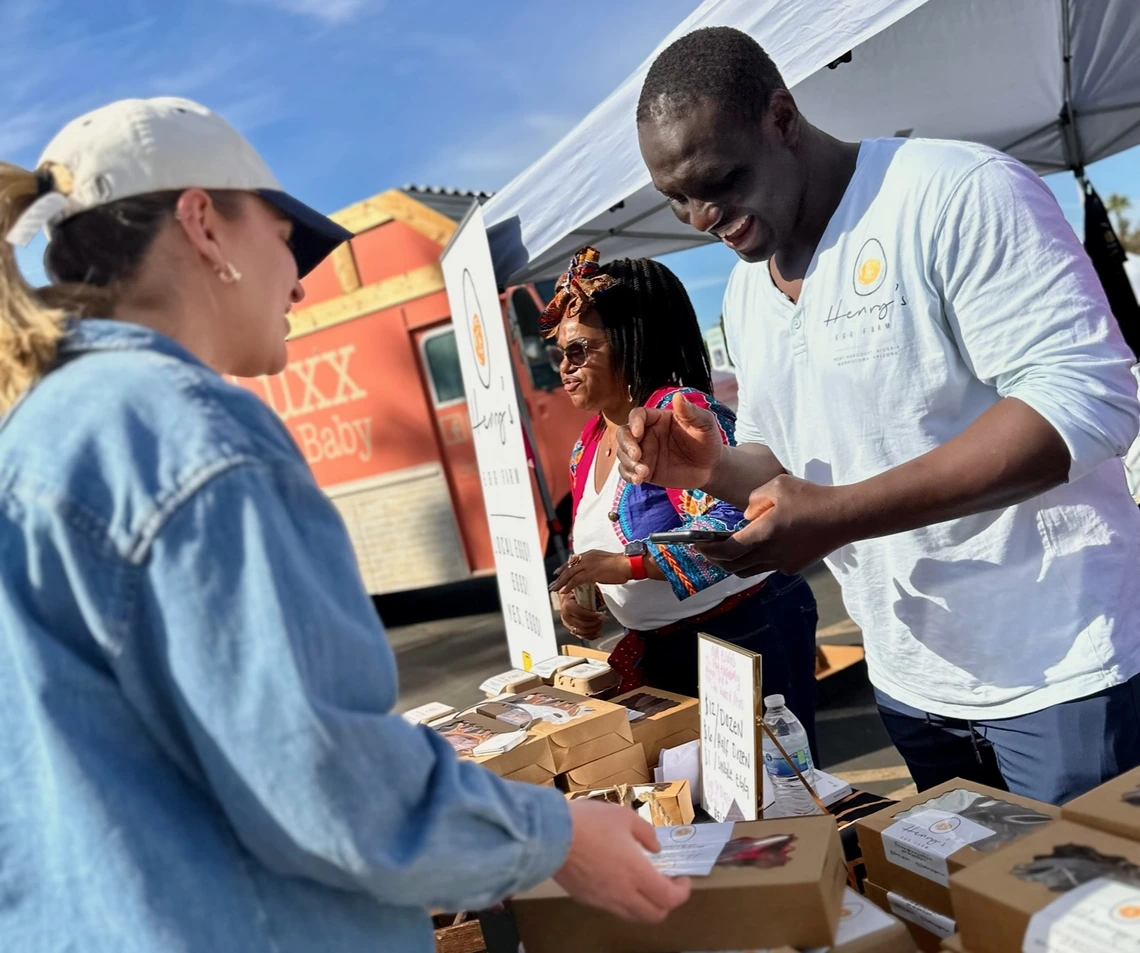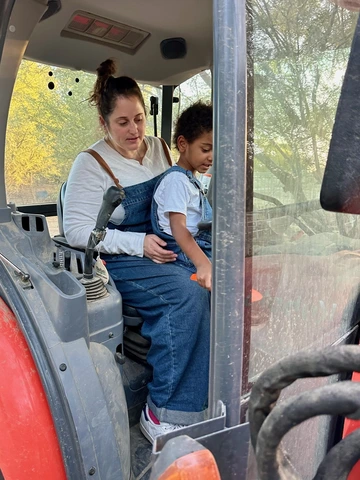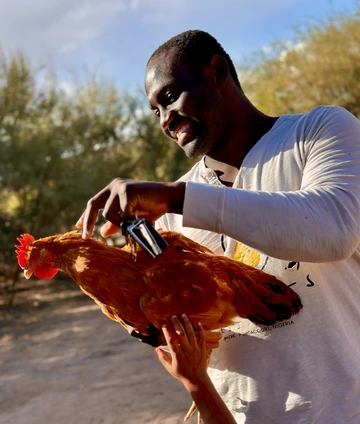Cooperative Extension Center helps urban and small-scale farmers learn the ropes
The Center for Urban Smart Agriculture brings together University of Arizona research, government resources and other stakeholders to help new and small farmers thrive.

Henry Osineke Eziama sells eggs from Henry's Egg Farm at farmers markets in Phoenix. Henry's Egg Farm also sells to local chefs and restaurants.
Photo courtesy Henry's Egg Farm
Henry Osineke Eziama and his wife, Julie Augenstein, have two egg farms.
The larger one, a 20,000-bird operation, is in Eziama’s native Nigeria. But their other farm is on 20 acres of mesquite bosque in Morristown, Arizona, where they have 2,000 hens, Eziama said.
Both farms, started in the past five years, have the same mission – getting quality food to people who need it. Food security is a problem in sub-Saharan Africa, but the couple realized that food security is an issue here, too.
“It might have a different face, but it’s still a problem. People might have access to food, but it’s not high-quality food,” Eziama said.
Eziama, 42, and Augenstein, 41, are the type of farmers University of Arizona Cooperative Extension’s Center for Urban Smart Agriculture is designed to help – farms under 50 acres with less than 10 years of experience.

Pediatric emergency physician Julie Augenstein and her husband, Henry Osineke Eziama, are raising their son, Henry, 4, surrounded by nature and agriculture at Henry's Egg Farm in Morristown, Arizona.
Photo courtesy Henry's Egg Farm
The center offers online education, research, connections to local and national resources and other information to fill the knowledge gaps beginning farmers face. Center staff facilitate collaboration among Extension specialists, farmers, government agencies, non-profits and the business community – all aimed at helping farmers learn.
“In a nutshell we're trying to provide for them whatever information that they need to become sustainable and successful entrepreneurs,” said Sara Hipperson, an Extension urban agriculture program coordinator at the center.
“How do I access land? How do I get the startup funds? How do I continue with grants? And then, of course, anything related to revenue generation, the marketing side, the business side, then even just simply pricing strategy.”
In 2022, 55 percent of Arizona farms were smaller than ten acres and 76 percent had fewer than 50 acres – the U.S. Department of Agriculture threshold for small-scale farming. And although urban farming is on the rise, more than 80 percent of farms in Greenlee, Apache, Navajo and Coconino counties are under 50 acres, according to a recent U of A analysis.
Arizona’s small-scale farms are growing a wide variety of foods, Hipperson said.
“It's very diverse. We have mushroom farmers, egg farmers, goat cheese farmers. The majority of them are in the vegetable realm. We also have smaller pecan and apple farmers. Up north lavender and cut flowers are becoming a much larger farming community. Honestly, there isn't really much you can't do when you're small scale,” she said.
Eziama and Augenstein chose eggs because they offer a lot of advantages. They’re portable, easy to cook and don’t require refrigeration. They also contain every essential amino acid, said Augenstein, an emergency pediatrician and faculty member at the Mayo Clinic School of Medicine and University of Arizona, where she graduated from medical school.
Before they started egg farming five years ago, Eziama was a food industry executive. He holds a masters degrees in food engineering from University of Nigeria and economics from University of Texas.
After working for the World Bank FADAMA Project supporting Nigerian farmers, he came to the U.S. food industry, eventually becoming vice-president for food quality and safety at a large-scale producer.

The chickens at Henry's Egg Farm in Morristown, Arizona, live in the shae of a mesquite bosque.
Photo courtesy Henry's Egg Farm
There is often no middle-man between small-scale farmers and their end customers. Hipperson estimates that 90 percent find and maintain relationships with their customers directly through CSAs or farmers markets.
Augenstein and Eziama, with the help of their 4-year-old son, Henry, sell their eggs mainly directly to consumers at farmers markets and small restaurants. Smaller operations face more uncertainty than larger producers like Shamrock, who sell millions of eggs on contract months in advance.
You never know how many customers might show up at a farmer’s market, Eziama said.
Small farmers also help each other. They’ve gotten great advice from other farmers and local food industry leaders. One thing they’ve learned is that if you have a great product, you don’t need a marketing team to sell your eggs. Having a high quality product you believe in and a commitment to community can go a long way, Augenstein said.
“People tasted our eggs, and that was enough. Private chefs heard about us, then from there restaurants heard about us and the community heard about us. It kind of took off from there,” she said.
They try to keep the focus on connecting their community with healthy food, which they have found to be a common thread among small-scale farmers they’ve met.
“These are truly people wanting to feed the community and to provide a good product that makes our community healthier and stronger,” Augenstein said.
“Every single week, we do our wholesale orders, and we do our farmers markets, and we feel passionate again and thankful and ready to help others. If you want something to really show you the power of community, I think the experience of becoming a farmer has done it.”
The Extension center’s early goals include finding grants for urban ag research and getting more researchers on the ground. What they study will be guided by ongoing needs assessment.
“As an academic institution and a big component, and a proponent of the university is research, so that's something we're definitely pushing towards,” said Naomi Pier, an Extension entomologist and program manager at the center whose background is in large-scale commercial farming research.
Goals on that front include encouraging university scientists to bring their expertise from Arizona’s large-scale farming operations, where there might be many hundreds of acres of one crop, to the scale of urban agriculture, where one farm might be growing 20 products, she said.
Eziama’s advice to beginning farmers is to set aside fear and take the leap. Don’t wait until you know what you’re doing.
“There’s a gap between knowing and doing, and a lot of what matters is in the doing. That’s where entrepreneurship actually starts. A lot of people want to figure it all out before they step out. Do it. Do it with all your heart, and do it well,” he said.
To learn more about being a small-scale or urban farmer, see the Cooperative Extension Center for Urban Smart Agriculture website.

